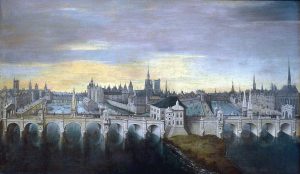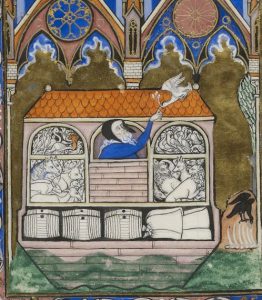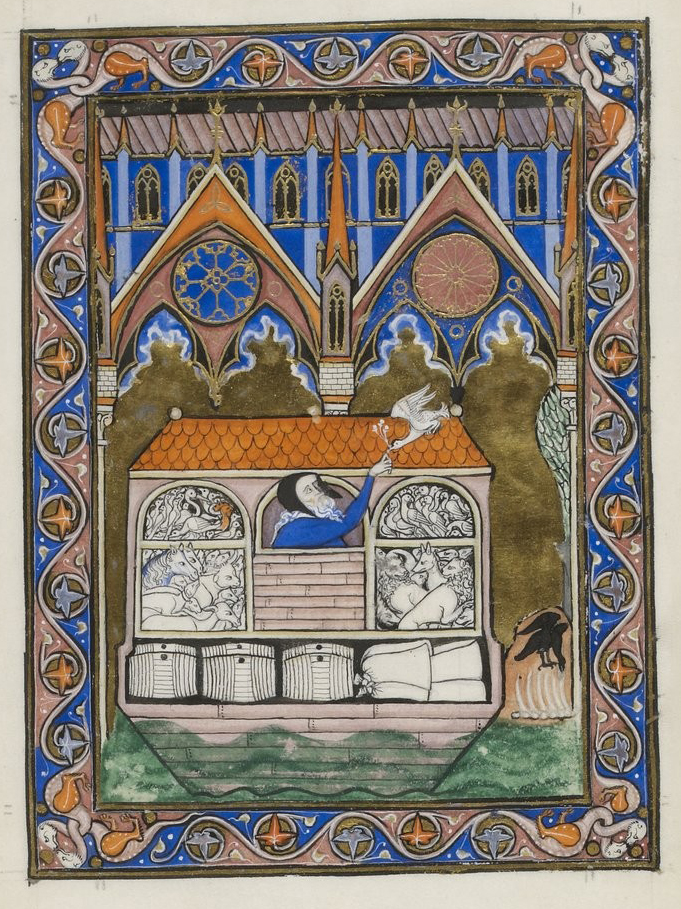2024 International Medieval Congress at Leeds: Call for Papers
August 9, 2023 in Announcements, Call for Papers, Conference Announcement, International Congress on Medieval Studies, International Medieval Congress, Leeds, Uncategorized
RGME Call For Papers
for the 2024 International Medieval Congress at Leeds
(1–4 July 2024 in hybrid format)
“Building Bridges ‘Over Troubled Waters’
For 25 Years and More”
An Inaugural RGME-Sponsored Session at Leeds
[Posted on 9 August 2023]

Paris, Musée Carnavalet, Projet pour le Pont Neuf, circa 1577. Image via Wikimedia via Creative Commons Attribution 3.0 Unported.
The Research Group on Manuscript Evidence prepares an Inaugural Sponsored Session at the International Medieval Congress (IMC), University of Leeds, United Kingdom, to be held in hybrid format from 1st – 4th July, 2024. This Session comprises our first Sponsored Session at the Congress.
The Congress subject for 2024 is “Crisis”. The RGME Theme for its Anniversary Year of 2024 is “Bridges”.
For the 2024 ICMS at Leeds we propose to examine subjects pertaining to the challenges and opportunities of “Building Bridges Over Troubled Waters”. We invite your proposals for Papers for this Session.
Our 2024 Anniversary Year: “Bridges”
In 2024 the Research Group on Manuscript Evidence (RGME) celebrates its 25th Anniversary as a Nonprofit Educational Corporation based in the United States and its 35th Anniversary as an International Scholarly Organization founded in England.
To mark our anniversary year
, we prepare sponsored Sessions, as usual, for the International Congress on Medieval Studies (ICMS) at Kalamazoo in May. See our Call for Papers for the 2024 ICMS.
Also, for the first time, we prepare an Inaugural RGME-sponsored Session for the International Medieval Congress (IMC) at Leeds in July 2024.

Paris, Bibliothèque nationale de France, Département des manuscrits, MS Lat 10525, fol, 3v, detail. Noah’s Ark. Image Public Domain via https://gallica.bnf.fr/ark:/12148/btv1b8447877n.
The 2024 Leeds Congress: “Crises”
The chosen “Thematic Focus” for the Leeds Congress in 2024 is “Crisis”.
Bridges and “Troubled Waters”
Under our guiding concept of “Bridges” for 2024 (see Bridges for our 2024 Anniversary Year), the RGME invites papers for a Session at Leeds on all kinds of bridges and bridge-related topics. Be it more literally, as physical architectures and landmarks, such as historically significant specimens, be it more abstractly, as architectural devices of the mind that enable us to make unexpected and unpredicted connections between marginal, off-field, divergent media, methods, and subjects that are usually not made or ignored.
In addition, we ask how bridges answer to different forms of crises, especially, but not only, with regard to communication, travel, social, cultural or political relations, or of the natural environment. In turn, we are also interested in papers that discuss how the establishment and maintenance of bridges may prevent crises or, contrarily, cause new unforeseen forms of crisis.
In summary, we welcome all bold bridge-makers willing to traverse pathways that others have not dared to take. In such ways, we might also respond to the opportunities and challenges which the captain and officers on the bridge of a ship can observe directly, better to steer a course forward in the passage.
How to Submit your Proposal
for a Paper for our 2024 Session at Leeds
— Due by 31 August 2023
“Building Bridges ‘Over Troubled Waters’ ”
Session Co-Organisers:
Ann Pascoe-van Zyl (Trinity College Dublin)
and
Michael Allman Conrad (Research Group on Manuscript Evidence and Universität St. Gallen)
We invite abstracts of 200–300 words. Your proposals for papers should be made directly to the organisers by 31 August 2023.
We seek papers on a wide range of subjects pertaining to Bridges and to Crises.
Our own experience with RGME activities over the years, in promoting the possibilities of “Building Bridges” between disciplines, centres, and individuals, provides a keen interest in these issues and potential solutions. See, for example, our
From your Proposals due by the end of August, the RGME Session will be selected and submitted to the Congress at Leeds by 30 September 2023. We will inform you of our selection by that time.
Congress information
- Congress Website
https://www.imc.leeds.ac.uk/imc-2024/ - Proposal Criteria
https://www.imc.leeds.ac.uk/proposals/criteria/
The Congress will be held in person, with provisions for online participation. In this way, we hope that you might be able to attend onsite or at a distance, depending upon your travel arrangements.
Deadline for Paper Proposals: Due by 31 August 2023
Please send your Proposal of 200–300 words for your Paper to the organisers at their address below. Might you please note your preferred mode for presenting your paper — in person or virtually.
Address to send your Proposals: [email protected]
For information about this RGME Inaugural Session at the IMC, please contact the Session Co-organisers at their address.
We look forward to your contributions.
*****

Paris, Bibliothèque nationale de France, Département des manuscrits, MS Lat 10525, fol, 3v, detail. Noah’s Ark. Image Public Domain via https://gallica.bnf.fr/ark:/12148/btv1b8447877n.
*****
